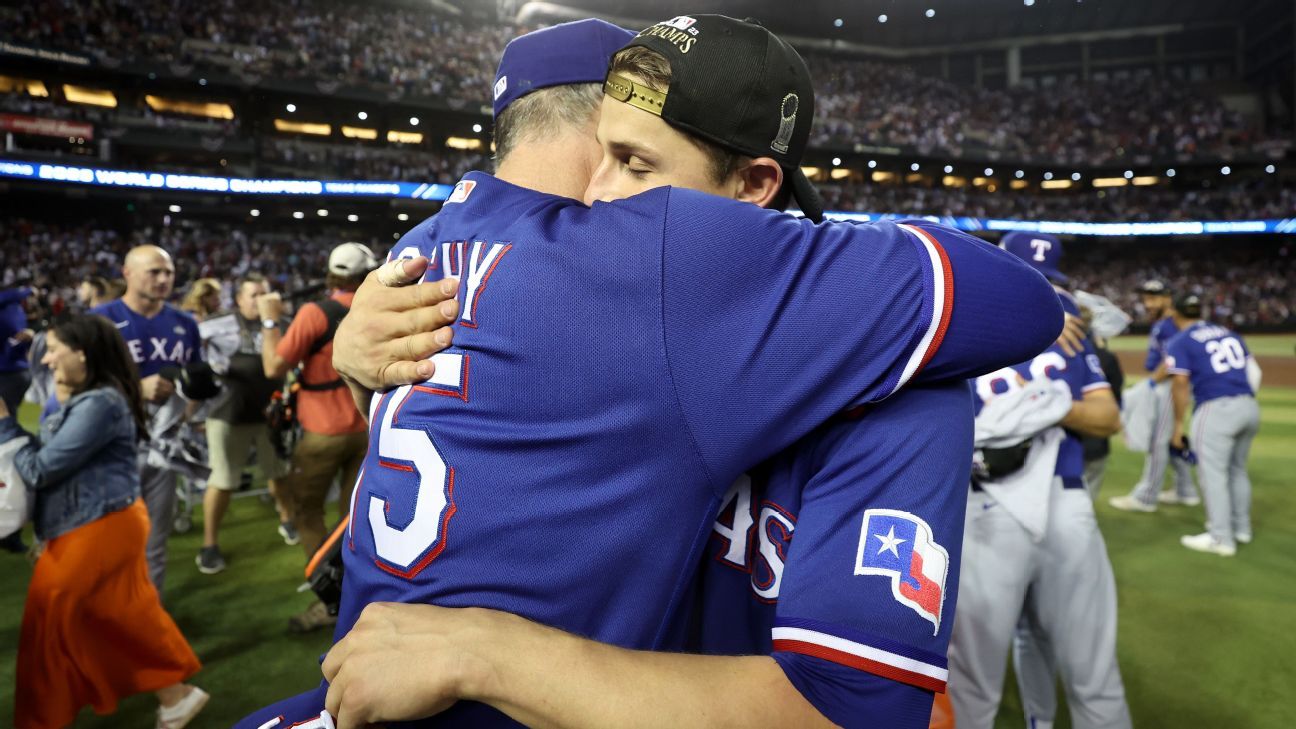[ad_1]
PHOENIX — The Texas Rangers had just won the franchise’s first championship Wednesday night, and Bruce Bochy was hugging each of his players in turn, including a big embrace of shortstop Corey Seager, who told his manager that he loved him, and thanked him. Somebody started handing out the championship T-shirts and caps, and that was the first time Bochy seemed to get a little annoyed.
There are two things for which Bochy will be best remembered in baseball. The first is that he is among the preeminent managers in baseball history — perhaps the best. His teams in San Francisco and Texas have four championships in the past 14 seasons; generated a 6-0 record in winner-take-all-games; and posted a stunning 17-4 record in games his teams had an opportunity to clinch, as the Rangers did in Game 5.
The other is that Bochy has an outsize skull, something teammates and friends have long teased him about. The jokes usually make him laugh. But in this moment on Chase Field, with all the warm feels being passed around among the Rangers, Bochy wanted a championship hat, and the first handed to him briefly sat in the middle of his head like a beanie. “This hat is too small,” Bochy said sharply, reaching for another.
Bochy reached for another, then another, and eventually got the hat he wanted and rejoined the joyous celebration. Cap firmly atop his head, he resumed hugging a group of players who understood what he had done for all of them when he came out of a pseudo-retirement last winter to take over a team that won 68 games.
When asked what the Rangers manager meant to the team through this improbable championship run, second baseman Marcus Semien‘s answer was simple: “Everything.”
“We had a tough year last year,” Semien said. “Nobody wanted to be there. Boch came in and said right from the jump, ‘This is our goal.'”
Said Seager: “What he’s done for this team, and what he’s done for this group, it’s unbelievable.”
The only manager in the past six decades to win as many titles as Bochy was Joe Torre, who was at the Yankees’ helm when they won four championships in five seasons from 1996 to 2000. On Wednesday morning, Torre walked through the lobby at a Phoenix-area hotel, stopping for a short chat with reporter about Bochy, who manages in the postseason in a style very similar to the way Torre did — with a distinct urgency and focus on winning each particular game, without concern about the next day’s game or whether his choices might anger one of his players.
Bochy’s handling of his pitching Wednesday epitomized this: Bochy trusted Nathan Eovaldi to constantly work out of jams, and the Diamondbacks went 0-for-9 with runners in scoring position in the first five innings. Then, after turning to his bullpen, he used Aroldis Chapman for a few batters before turning to Josh Sborz, a reliever who emerged late in the Rangers’ season, in the eighth. Bochy then read that Sborz had great stuff, and just stayed with the right-hander rather than call on his usual closer, Jose Leclerc.
There was no script handed down from the front office, no dictums from analysts. General manager Chris Young, who had played for Bochy, told him when he was hired that Young would let him manage, and that’s what Bochy did all summer, and through the postseason. Watch. React. Manage.
Just north of Houston, the guy who first made Bruce Bochy a big league manager watched his old friend win another championship.
In a phone conversation Wednesday morning, Randy Smith recalled the first time he met Bochy, when he was a teenager. Smith’s father, Tal Smith, ran the Houston Astros‘ front office, and Bochy was a young catcher with the team. A decade or so later, Randy Smith was the farm director for the San Diego Padres, and through his work, he watched Bochy handle teams in the lower minor leagues. Smith thought that Bochy possessed an unusually advanced understanding of pitching, and how to run a pitching staff, and he was very comfortable dealing with players. He had been a part-time player, spending a lot of time with pitchers in the bullpen, and seemed to connect to all corners of a roster, to players of all backgrounds. “A natural leader,” Smith recalled. “He knew what buttons to push — when to pat someone on the back, when to kick someone in the butt. And he could defuse situations with his humor. He has inner confidence, but he’s not arrogant.”
They talked baseball over dinner, and along the way, Smith told Bochy that if he ever became a general manager and had the chance to hire a manager, he would hire Bochy.
Smith eventually moved on to the Colorado Rockies, in advance of the expansion draft, but early in the 1993 season, he was rehired by the San Diego Padres, after Padres owner Tom Werner ordered a dismantling of the increasingly expensive roster. By then, Bochy had advanced through the minor leagues to become the third-base coach of the Padres.
After the 1994 season, the Chicago Cubs asked for permission to hire San Diego manager Jim Riggleman, and when Riggleman departed for the North Side, the Padres needed a manager. As it turned out, there would be no formal interviews, because Smith knew exactly who he wanted.
The Padres were in the midst of being sold by Tom Werner to a group headed by John Moores and Larry Lucchino, which meant that Smith had to go through some extra layers to have Bochy’s hire approved. He asked Dick Freeman, the Padres’ president, and Freeman was enthusiastic, but told Smith he had to call Werner — and Werner told him that he needed to run the decision past Lucchino. When Smith reached Lucchino, the former Orioles executive raised the idea of considering longtime Baltimore manager Johnny Oates.
Smith balked — he had one year left on his contract, for 1995, and he felt that if he was going to have his career on the line, he wanted the guy he had pegged as a future big league manager years before. That guy was Bruce Bochy. It was Smith’s decision, especially since, as it turned out, Lucchino wasn’t entirely clear on the identity of the Padres’ new manager; he thought Smith was referring to former Seattle first baseman Bruce Bochte.
Bochy’s first contract was a one-year deal for $125,000 for 1995, with a club option for 1996, and a $25,000 buyout.
This is his 26th year as a major league manager, and he continues to do what Smith thought he would do. “I’ve never known a Bochy team to underachieve,” Smith said. “They either overachieved or lived up to their potential.”
The 2021 Rangers lost 102 games, and then 94 in 2022. Young was empowered by owner Ray Davis to do what he felt was needed to win, and so the front office spent more than a half billion to sign Seager, Semien and Jon Gray, in 2021, following that by adding Nathan Eovaldi and Jacob deGrom. And like Smith, Young knew exactly who he wanted to hire a year ago, when the Rangers needed a manager — he wanted Bochy.
When you manage against Bochy, Diamondbacks manager Torey Lovullo said before Game 5, you assume he’s not going to make any mistakes in handling his lineup or his pitching. “He’s going to be spot on,” Lovullo said. “He’s going to be two clicks ahead of anybody in the baseball universe… and if he has a chance to ram it down your throat, that’s what he’s going to do.”
During games, Lovullo said, his eyes pingpong from the game action to the data sheets in front of him, back and forth, as he cross-references what’s in front of him with the statistics that sometimes serve as a backbone of forthcoming decisions. Lovullo feels comfortable with this frantic pace — but he has glanced over at Bochy and sees someone very good at his job doing it very differently: Bochy often sits with his arms folded, appearing relaxed, like a parent taking in a T-ball game, seemingly never taking his eyes off the players on the field and what they’re doing. “I can’t multi-task,” Bochy said. “I’ve got to just watch the game.”
Like Lovullo, Bochy has access to enormous stores of data, and there is information laid out in front of him during the game, the loose framework of the pregame pitching plan and some specific details about possible matchups — and Bochy will lean forward and glance over those numbers from time to time.
But mostly, he watches, before reacting to what he sees. In the Rangers’ Division Series against the Baltimore Orioles, he called on Cody Bradford, a left-hander coming off an unremarkable rookie season in which he posted a 5.30 ERA. Bradford got through a scoreless inning, and Bochy continued to watch and Bradford continued to pitch — 3⅔ innings, in the end, allowing no runs. To Bochy, it was simple: Bradford was pitching effectively and Bochy thought it right to stick with him.
Before Game 5 of the World Series, he considered the likelihood that all the pitchers Lovullo would use would be right-handed and decided to stack Seager and rookie Evan Carter, two left-handed hitters, back to back. This was a move, one rival evaluator said during Game 5, that was subtle but important and smart — and in the end, pivotal. The Rangers scored the first run of the last World Series game after Seager rolled a soft single to left field, Carter pulled a double to right field, and Mitch Garver singled to drive in Seager — with, as it turned out, the run that would force Bochy to find a suitable championship cap.
“It’s unreal,” Bochy said, in his deep Sam Elliott voice that sounds like an echo from some Western. “I’m a byproduct of what these guys did.”
Seager, Semien and Randy Smith would probably argue that it’s the other way around.
[ad_2]
Source link



